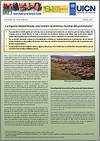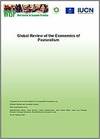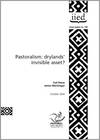This declaration was made at the world gathering of nomadic and transhumant pastoralists in Segovia, Spain in September 2007. Two hundred nomadic and transhumant pastoralists urged governments and international organizations to recognise the importance of pastoralism and to support pastoralist communities worldwide.
Year of publication: 2007Organization: Commission économique pour l'Afrique
Topic: Participation
Language: English
Type of document: Politiques et législation
Geographical coverage: Global
Niger’s experience in terms of pastoralists’ mobility and cattle circulation rights is a model and may be presented through an overview of some key relevant laws. This overview reveals that the policies boil down to a few strong principles, and Niger’s contribution to the sub-region’s recognition of the need for and usefulness of mobility (international transhumance) in the ECOWAS zone. Asserting these principles has assured pastoralists recognition of their activity, their way of life, and their specific rights across an important portion of the national territory. However, in the study area, the enforcement of texts is not beneficial to pastoralists and in a context of a strong demographic growth, recognition of their rights is made more difficult by the rush for land tenure. As a result of the loss of consideration for their way of life and the lack of recognition of their contribution to the development of pastoral areas, they are asking for the States Generals on pastoralism to be convened to allow them to contribute to the Pastoral Code in preparation.
Year of publication: 2007Organization: Auteurs individuels, Union internationale pour la conservation de la nature (IUCN)
Topic: Conflit, Les savoirs autochtones, Innovation, Régime foncier, Organisation, Participation
Language: English
Type of document: Politiques et législation
Geographical coverage: Afrique occidentale
The study contributes to building an enabling environment for pastoral sustainable rangeland management through enhanced local-level advocacy based on sound knowledge management on the impact of current policies on pastoralism. This Sudan case study is focused on the national policy towards Traditional Livestock Migration Routes (Darfur States Case). The study evaluates the success of the intervention carried by The Administrative Committee for Routes Delineation - Darfur States (ACRD-DS) and the impact this has had on the wider pastoralist environment. It contributes to WISP’s efforts to demonstrate that, given an enabling policy environment, pastoralists can be the best custodians of the drylands environment.
Year of publication: 2007Organization: , Auteurs individuels, Union internationale pour la conservation de la nature (IUCN)
Topic: Organisation
Language: English
Type of document: Technique
Geographical coverage: Afrique orientale
Transhumant pastoralism is a reality in animal production systems in the Sahel and West Africa (SWA), which despite its importance, it still faces serious obstacles that threaten its potential production. This policy note aims at highlighting the best ways at international and regional levels in order to develop and implement policies and strategies aimed to support transhumant pastoralism while creating conditions for change to sedentary agro-pastoralism.
Year of publication: 2007Organization: Auteurs individuels, Banque mondiale
Topic: Économie, Innovation
Language: English
Type of document: Politiques et législation
Geographical coverage: Afrique du Nord, Afrique occidentale, Afrique centrale
Le pastoralisme mobile est la manière la plus durable de gérer les pâturages du monde, et les utilisations alternatives de la terre viennent avec des coûts environnementaux et économiques. L’ampleur de ces coûts n’est pas encore bien connue, et ils peuvent être encourus à l’insu de beaucoup de personnes. Si les pays disposant de pâturages importants désirent inverser la désertification et arriver à bout de la pauvreté, alors il est crucial de reconnaitre la logique environnementale du pastoralisme mobile et son important potentiel économique.
Year of publication: 2007Organization: Union internationale pour la conservation de la nature (IUCN)
Topic: Économie
Language: 中文, English, Français, Español
Type of document: Politiques et législation
Geographical coverage: Global
Cette revue de la littérature sur l'économie pastorale est une contribution à la prise de conscience mondiale sur l'importance du pastoralisme mobile en tant que forme de gestion productive et durable des terres. Cette revue vise à mettre en lumière le savoir existant quant à la valeur du pastoralisme, les lacunes liés à ce savoir, les tendances dans les économies pastorales, et les options politiques pouvant appuyer le plus efficacement possible les économies des milieux arides.
Year of publication: 2006Organization: Union internationale pour la conservation de la nature (IUCN)
Topic: Économie
Language: English, Français, Español
Type of document: Technique
Geographical coverage: Global
Eight regional studies were carried out in the context of the Global review of the economics of pastoralism. The studies identify how pastoralism contributes to domestic and global markets in different regions. The studies capture the following regions: Horn of Africa and Southern Africa; West Africa; Eastern Africa; Northern Africa; South America; Asia; Middle East; and Europe.
Year of publication: 2006Organization: Union internationale pour la conservation de la nature (IUCN)
Topic: Économie
Language: English
Type of document: Technique
Geographical coverage: Amérique du nord, Amérique Latine, Europe, Proche-Orient, Afrique du Nord, Afrique occidentale, Afrique centrale, Afrique orientale, Afrique australe, Asie centrale, Asie du Sud
Nombre de législateurs en Afrique de l’Est ont des préjugés quant à la valeur du pastoralisme en tant que système d’utilisation des terres et le considèrent comme étant économiquement inefficace et néfaste pour l’environnement. Pourtant, cela ne s’appuie aucunement sur des preuves. Non seulement il n’existe pas de consensus quant au modèle économique dynamique du pastoralisme, mais encore il n’existe pas de dispositif pour informer la prise de décision du gouvernement quant aux avantages qu’il présente par rapport à d’autres utilisations des terres. Pour estimer la valeur du pastoralisme, il faut un nouveau cadre conceptuel qui sache dépasser les critères économiques classiques afin de fournir un nouvel aperçu de sa contribution à la réduction de la pauvreté, à la gestion durable de l’environnement et au développement économique des zones arides d’Afrique de l’Est dans un contexte d’incertitudes climatiques toujours croissantes. Cet article propose un tel cadre.
Year of publication: 2006Organization: Institut international pour l'environnement et le développement (IIED)
Topic: Économie, Value addition
Language: English, Français
Type of document: Technique
Geographical coverage: Afrique orientale









